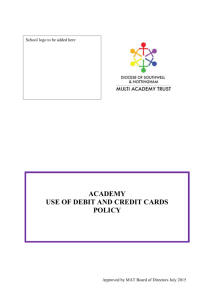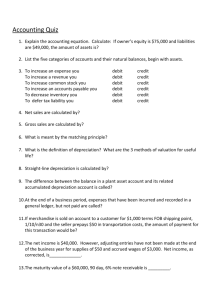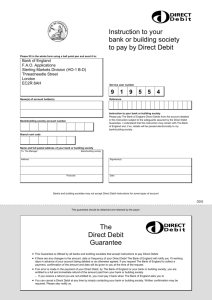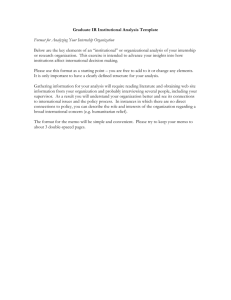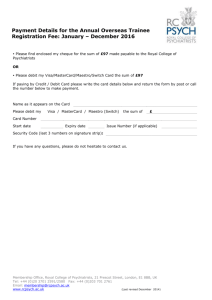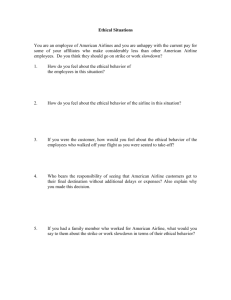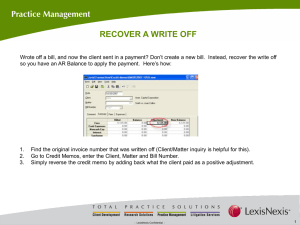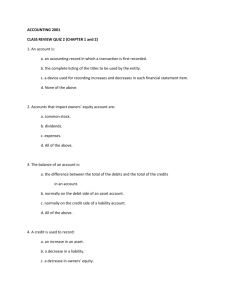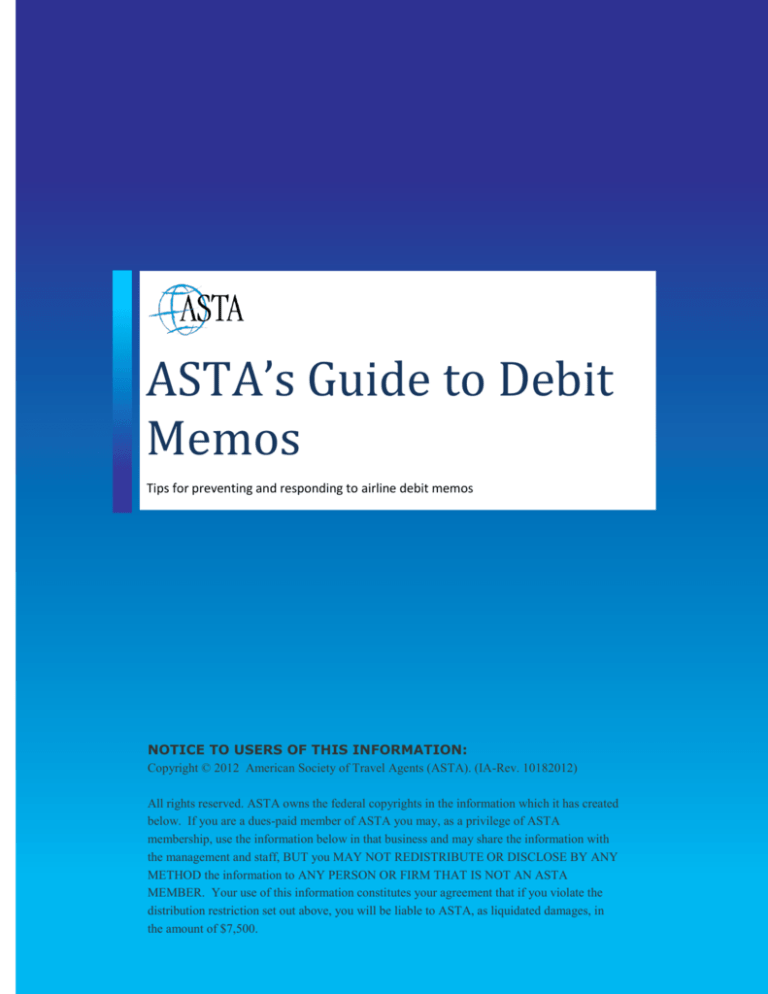
}
ASTA’s Guide to Debit
Memos
Tips for preventing and responding to airline debit memos
NOTICE TO USERS OF THIS INFORMATION:
Copyright © 2012 American Society of Travel Agents (ASTA). (IA-Rev. 10182012)
1
All rights reserved. ASTA owns the federal copyrights in the information which it has created
below. If you are a dues-paid member of ASTA you may, as a privilege of ASTA
membership, use the information below in that business and may share the information with
the management and staff, BUT you MAY NOT REDISTRIBUTE OR DISCLOSE BY ANY
METHOD the information to ANY PERSON OR FIRM THAT IS NOT AN ASTA
MEMBER. Your use of this information constitutes your agreement that if you violate the
ASTA’s
Guide torestriction
Debit Memos
distribution
set out above, you will be liable to ASTA, as liquidated damages, in
the amount of $7,500.
DEBIT MEMOS
A debit memo is a bill or demand for payment from either an airline or the Airlines Reporting
Corporation (ARC) to a travel agency for charges it believes the agency owes. An airline can distribute its
debit memos directly to an agency or indirectly through ARC via Memo Manager.
THERE ARE two basic classifications of debit memos.
an airline demand for payment outside the Agent Reporting Agreement (ARA)
a breach of the Agent Reporting Agreement (ARA)
AIRLINE DEBIT MEMOS OUTSIDE THE AGENCY AGREEMENT
Most airline debit memos fall outside the ARA and are not considered breaches of the agent agreement.
Examples of debit memos that are typically not considered breaches of the ARA include, but are not
limited to the following.
Pricing and fare rule errors
Booking violations (i.e. churning, duplicate names, etc.)
Administrative mistakes (i.e. missing discount code, etc.)
If these debit memos are not amicably resolved, the airline can threaten to terminate your appointment
in an attempt to force payment and such threats should be taken seriously. While ARC Memo Manager
can be used by an airline to facilitate the processing of these debit memos, ARC’s role s purely
administrative. ARC cannot use its collective power to force you to pay these debits.
Since these debit memos fall outside of ARC’s jurisdiction, the Travel Agent Arbiter (TAA) can only be
used to resolve these disputes if both parties agree to arbitration. And in ARC’s nearly 30-year history,
this option has only been exercised once.
ARA ENFORCEABLE DEBIT MEMOS
Debit memos issued by ARC in response to a breach of the ARA are serious. In such cases, ARC can use
its collective power and threaten termination to force collection on behalf of a single airline. ARC can
immediately terminate an agent’s appointment if there is clear and present danger of substantial loss.
The most common breaches of ARA enforceable debit memos follow below:
2
Unreported sales
ASTA’s Guide to Debit Memos
Credit card chargebacks - expired card, invalid credit card number, invalid/no authorization
approval code, unauthorized charge, fraud/unauthorized charge
Flown and refunded ticket (duplicate usage)
Back-dating of tickets
Use of the agent’s credit card for ticket payment not authorized by the airline
The reporting of cash refunds against sales made on credit cards
A full list of breaches can be found in Section XV of the ARA. Should these debit memos result in
termination of the ARC Agreement with the agent, the agent has the right to appeal the decision to the
Travel Agent Arbiter.
ARC MEMO MANAGER
Memo Manager is ARC’s electronic debit and credit memo processing system. It is a free service to
travel agents that allows airlines and agents to electronically manage the debit memo dispute resolution
process. Both parties can communicate with each other through this system. Once a resolution is
reached, Memo Manager provides for the processing of payments (credits and debits) through the
agency’s Interactive Agent Reporting (IAR) sales report.
Debit memos in Memo Manager that have the “TRS” checkbox selected should be considered serious as
these debit memos have been identified by the airline or ARC as a breach of the agency agreement. TRS
stands for “Ticket Resolution Service”, which is the special department at ARC that oversees the
processing of all ticket-related breaches of the agent agreement. Failure to resolve these debit memos
could put your agency’s ARC agreement at risk.
While agency use of Memo Manager is not mandated by ARC, some airlines have modified their policies
to require agents to use the product. Please note that ARC will not automatically draft your account for
unpaid debit memos. ARC will only draft your account once you authorize payment. That said, ARC
and/or an airline may threaten termination for failure to pay a debit memo that is not eventually
resolved.
COMMON TYPES OF DEBIT MEMOS
GDS BOOKING VIOLATIONS
Most U.S. airlines prohibit certain GDS booking practices that increase their GDS distribution costs or
negatively impact their inventory control programs. Airlines are actively debiting agencies for the
following practices:
3
ASTA’s Guide to Debit Memos
Creating duplicate, fictitious and speculative bookings
Churning reservations (repeatedly rebooking and cancelling segments)
Use of billable passive segments
Failure to cancel unused inventory
Failure to work airline schedule changes and cancel inactive segments
GROUP POLICY VIOLATIONS
Many airlines require agents to use the airline’s group department for large parties, often defined as 10
or more passengers that have at least one common flight segment. The airlines argue that groups of 10
or more are unique and require special handling at the airport. As a result, most airlines actively audit
and debit agents for noncompliance. Typically, airlines reserve the right to charge travel agents a per
passenger fee, per PNR, plus lost revenue for these violations.
CREDIT CARD CHARGEBACKS
A chargeback is when a customer makes a claim that a charge was unauthorized or that travel services
were not rendered. When the credit card company receives the dispute, they send it to the credit card
merchant, which is often the airline. If the tickets were issued by an agency, the airline will forward the
chargeback, usually in the form of a debit memo, to the agency that issued the tickets.
Credit card companies set the rules governing credit card transactions. These rules are very specific;
however, if adhered to closely they will relieve an agency of liability in the event of a chargeback.
The primary way to protect against chargebacks is the use of the Universal Credit Card Charge Form
(UCCCF). This form should be completed at the time of purchase and must include an imprint of the
credit card, the signature of the card holder, and the credit card approval code. When an agency
receives a chargeback from an airline, the agency must send copies of this documentation to the airline.
When an airline sends a notification of a credit card chargeback, the agency is required to respond to
the airline within seven business days from the issuance date of the debit memo. If a chargeback
notification is sent to you via fax, you must send your response to the airline within five business days
from the date shown on the debit memo. In practice, this means that the agency must send the
documentation through Memo Manager or by express delivery. There have been cases when an agency
had the required documentation but the airline refused to accept it because the response was not
received within the required time line.
4
ASTA’s Guide to Debit Memos
A couple of lesser-used forms of protection against chargebacks are the Address Verification System
(AVS) and the Limited Power of Attorney. These credit card acceptance procedures can be found in
Section 8 of the Airline Reporting Corporation Industry Agents’ Manual.
UNREPORTED SALES
It is essential that all sales be reported to ARC. Failure to report a transaction is a breach of the Agent
Reporting Agreement (ARA).
BACK-TO-BACK TICKETING
ASTA believes it is unfair to penalize agents for back-to-back ticketing. It is not the responsibility of the
agent to police how customers use their airline tickets after they have paid for them. That said, the
airlines strongly enforce this policy and for this reason, ASTA advises members not to knowingly issue
back-to-back tickets.
MISUSE OF GOVERNMENT OR MILITARY FARES
All government fares require that a government approved form of payment, such as a government
credit card or a Government Travel Request (GTR), be used. Government contractors are NOT eligible to
use government contracted fares and letters from a government contractor or government agency are
not sufficient.
Military fares are reserved for active duty military and their dependents. Most carriers require that
proper ID (as stipulated by each airline’s policy) be presented upon check-in. However, some carriers
may require that agents obtain additional passenger information before ticketing a military fare, such as
the passenger’s active military rank, branch of service, military base or installation, or other information.
Failure to provide this information upon request by then airline could result in a debit memo.
RESPONDING TO DEBIT MEMOS
Some airlines may be more willing to resolve errors with you than others. In some cases, your past
history with, as well as your support of, an airline, may play a role in how it responds to your request for
reconsideration or a concession.
If you need to contact an airline’s revenue accounting department outside of Memo Manager, a list of
contacts can be found at Section 1 of ARC’s Industry Agents’ Handbook On-line.
ASTA recommends you take the following steps when processing debit memos.
5
ASTA’s Guide to Debit Memos
Step 1: Determine the validity of the debit memo.
As with any bill, errors can occur. After careful review of the debit memo, determine if the airline has
proved that money is owed. If the memo is the result of agency error, even if it is a minor mistake, few
airlines are forgiving, regardless of how unintentional the mistake may have been.
Step 2: If you determine the debit memo to be valid, pay the debit memo promptly.
ASTA encourages you to dispute debit memos you believe to be invalid. However, if the debit memo
resulted from an agency error and the airline has provided sufficient documentation, paying it promptly
will help your agency keep a clean track record with the airline. This can be beneficial in the future
should you need to dispute another debit memo.
Step 3: If you are contesting the debit memo, respond in writing as soon as possible.
If you 1) need more documentation from the airline to verify their claim 2) have researched the issue
and determined that the debit memo is invalid or 3) feel that the amount is unreasonable for the
violation and you want to request a reduction, then you need to contact the airline promptly via Memo
Manager to dispute the memo. Any delay in responding may make it more difficult to get the airline to
review the matter and make a favorable decision.
Step 4: Decide whether to pay, while weighing the risks of non-payment.
If after disputing a debit memo in writing the airline still insists on payment, you will have to weigh the
risks of refusing to pay with the likelihood that the airline will take punitive action. This could include,
but is not limited to, termination of the agency’s authority to book or ticket on that airline.
Step 5: If you reach a dead-end, consider proposing a settlement with the airline.
If all else fails, it may be possible to negotiate a settlement with an airline. Some airlines have been
known to settle large debit memos, especially when the alternative is not good. For example, the airline
may feel it better to negotiate a settlement than forward the debit to a collection agency that may only
result in a partial payment of the debit memo, especially if the airline must add in the expense of
terminating the agreement with the agency. Proposing a settlement typically only works in limited
situations and if you can leverage your position in some way. Points of leverage may include the
following.
Argue poverty, especially if the amount of the violation is excessive and could put you out of
business.
6
ASTA’s Guide to Debit Memos
Argue that you did not “knowingly” commit the violation.
If you make this argument, be certain you can support it.
For example, if the debit is for churning, provide
documentation showing that different agents made
bookings on different days. Also, if applicable, be sure to
indicate that you will put in procedures to prevent this
Responding to
Debit Memos
from occurring again.
If the debit is the result of action by an Independent
Contractor, tell the airline that your agency had no
knowledge that this was being done by the IC and that
you will implement steps to prevent it from occurring
again.
When composing your response to the
airline we strongly suggest you follow
these guidelines:
Keep it short
Stick to the facts
Maintain professionalism
Step 6: If all else fails, seek legal advice.
If you don’t know what to do next, consult with an industry
While there are no guarantees, a
attorney. As an ASTA member you are eligible to receive a free 15-
concise and factual response will offer
minute initial consultation, a written estimate subject to the
the best opportunity to settle your
attorney's qualifications, and fifteen percent (15%) off each
dispute successfully.
attorney's regular fees. A list of participating attorneys can be
found as ASTA.org.
SAMPLE DEBIT MEMO RESPONSE LETTERS
Below are sample form letters and paragraphs that ASTA has drafted to help you respond to debit
memos. Because we have made these sample messages as general as possible, you will need to tailor
them to meet the needs of your unique circumstances.
ASTA cannot make any guarantee as to the effectiveness of the sample letters found below.
Agency Request for Documentation – SAMPLE MESSAGE
Dear Airline:
The enclosed debit memo did not contain sufficient documentation for us to
research whether we owe the money in question. Our policy is to never pay a bill
unless we reconcile with our records that we owe money. We ask that you send a
copy of the ticket(s) or other document(s) to support your claim. If it is valid, we will
promptly pay the bill. If the documentation is not sufficient, we will contact you
immediately to request additional information to help close the matter.
7
ASTA’s Guide to Debit Memos
Group Booking Policy Violations- SAMPLE MESSAGE
Dear Airline:
The attached debit memo alleges that [name of travel agency] violated your group
booking policy by booking through the GDS more than ___ travelers on at least one
flight segment. Our records indicate that the parties booked their travel
independently of one another and were in no way affiliated as a group. On this
basis, we request that you withdraw this debit memo.
GDS Booking Policy Violations- SAMPLE MESSAGE
Dear Airline:
The attached debit memo alleges that [name of travel agency] violated your GDS
booking policy prohibiting certain booking practices. Our research of GDS booking
history (enclosed) contradicts your claim and therefore we request withdrawal of
this debit memo.
Credit Card Chargeback – SAMPLE MESSAGE
Dear Airline:
The enclosed debit memo claims that [name of travel agency] owes money for a
charge that was rejected by [name of credit card company] as an unauthorized
charge. When we issued the ticket(s) against this credit card account, we obtained
an imprint of the card, the cardholder’s signature, and an authorization code
through [GDS or telephone] for the charge, as shown on the charge form. I have
included a copy of this document for your records.
Therefore, we are returning this bill to you for direct handling with the Credit Card
Company or GDS vendor, as appropriate.
Back-to-Back Ticketing - SAMPLE MESSAGE
Dear Airline:
Our agency had no knowledge that the customer was attempting to circumvent
fare rules by booking back-to-back tickets. This passenger made specific requests
and we complied with those requests. Our staff was not aware that the customer
made reservations which combined to create a back-to-back itinerary. On this basis,
we request a withdrawal of this debit.
8
ASTA’s Guide to Debit Memos
Our agency has a strict policy against issuing back-to-back tickets and a review of
our records will indicate that we have a clean track record with your airline. This
instance was inadvertent and resulted from a specific customer request. On this
basis we request that you withdraw this debit.
[NOTE: It is difficult to make this argument when back-to-back tickets are issued
sequentially.]
Unreported Sales- SAMPLE MESSAGE
Dear Airline:
The enclosed debit memo claims we did not report the ticket(s) listed in the debit
memo. The tickets were reported through ARC on our weekly IAR sales report(s). A
copy of the sales report(s) is attached. Therefore, we are returning this bill to you
for handling directly with the Airlines Reporting Corporation (ARC). Please feel free
to contact us if you need further support documentation.
TIPS FOR PREVENTING DEBIT MEMOS
The best way to prevent debit memos is to establish effective quality control processes and to educate
your front-line agents. Having procedures in place that enforce your agency’s adherence to airline and
ARC rules can prevent ticketing errors and costly credit card chargebacks. Below, are a few additional
tips for your review.
TIP # 1: Comply with the airline’s booking & ticketing policies
Review your agency’s GDS procedures to ensure that your agency is in compliance with airline policies
regarding duplicate and speculative reservations, churning (repeatedly rebooking and cancelling
segments), passive segments, and the proper management of inventory and airline schedule changes.
Most airlines have very similar booking and ticketing policies posted on their agency website. Yet,
enforcement of these policies will vary by airline.
TIP # 2: Adhere to group booking policies
Review your agency’s group booking practices to ensure that group bookings are referred to airline
group departments in accordance with airline policies.
9
ASTA’s Guide to Debit Memos
TIP # 3: Ensure ticketing & waiver codes are entered correctly on the ticket
Review your agency’s quality control procedures to ensure that all corporate rate codes and other
required ticketing & waiver codes are properly displayed in the ticket designator, tour code or
endorsements area of the ticket. If you receive a waiver from an airline representative for a special fare
or rule waiver, verify with the airline representative that they have entered the waiver in the PNR.
Should the waiver be questioned by the airline and the agency debited, most airlines will waive the debit
memo only if the airline’s Passenger Name Record (PNR) contains a valid waiver code. Once you are
armed with the waiver code and representative’s name, you should also record this information in the
PNR history and/or in a separate file that can be easily accessed.
TIP # 4: Obtain a credit card imprint and customer signature for credit card purchases
As stated previously, the most effective way to dispute a credit card chargeback is to respond with
documentation as detailed in Section 8 of the Airline Reporting Corporation’s (ARC) Industry Agent’s
Handbook. Following these procedures is also an effective way to prevent chargebacks, since customers
that provide a credit card imprint and signature on the charge form are less likely to dispute the charge
later.
Two lesser-used methods of protection against chargebacks, the Address Verification System and the
Limited Power of Attorney, are discussed in detail in Section 8 of the ARC manual.
TIP # 5: Avoid handwritten tickets
While IATA has eliminated paper tickets, ARC has not. That said, some U.S. and international airlines
prohibit the use of manual flight coupons by ARC agents. To see a list of carriers that accept paper
tickets, see ARC’s “Carrier Manual Traffic Document Acceptance Chart” at
http://www.arccorp.com/forms/pp/iah/current/iah5_1.pdf. If you do handwrite a ticket, it is important
that you make sure to include all the necessary elements, including an imprint of your own agency plate.
As a reminder, always check the validation date prior to processing a handwritten ticket. Generally,
most airlines are suspicious of handwritten tickets and will refuse to waive penalties for errors.
TIP # 6: Do not issue back-to-back tickets
ASTA’s best advice for avoiding these debit memos is to not issue back-to-back tickets.
10
ASTA’s Guide to Debit Memos
TIP # 7: Comply with government and military fare ticketing rules
Before issuing any ticket using a government fare, it is essential that you verify the eligibility of the
customer to use government fares and that a government approved form of payment (FOP), such as a
government credit card or a Government Travel Request (GTR), is used. Government contractors are
NOT eligible to use government contracted fares and letters from a government contractor or
government agency are not sufficient. Unless your agency has a contract to issue government fares, you
may be setting your agency up for a debit memo.
While most U.S. airlines allow any ARC-accredited agency to issue a military fare, some carriers require
agents to obtain additional passenger information to confirm eligibility. Agents should check individual
airline polices before issuing a military fare.
TIP # 8: Confirm an airline’s policy on refunds/exchanges before conducting the transaction
There are some situations, such as with airline strikes and involuntary cancellations due to weather or
equipment problems, in which an airline will allow a traveler to obtain a refund of a non-refundable
ticket. However, these situations are extremely rare. And when they do occur, it’s important for you to
know the airline’s policy regarding your role in the processing of the refund. Some airlines may allow
you to process the refund through ARC with the appropriate waiver code, while others, like American
Airlines (AA), may require that you forward the transaction to the airline for processing.
TIP # 9: Don’t assume all “open” tickets are eligible to be used in an exchange.
It is important that all of the following be reviewed before processing an exchange.
Ticket validity dates
Compliance of fare rules
Electronic Ticket Record (ETR) status
Warning: not all open ETRs are eligible for a refund or exchange. For example, if a passenger fails to
cancel a ticket prior to flight departure as required by the fare rule, the airline may leave the ETR open.
And while the ETR may appear to be “open” for an exchange, the exchange should not be processed by
the agent. The only way to protect yourself against unknowingly using an “open” ETR that is not eligible
to be used is to check your GDS history to see if your agency processed the cancellation as required by
the fare rule. If your agency did not process the cancellation, you or the traveler should contact the
airline for guidance.
11
ASTA’s Guide to Debit Memos
FREQUENTLY ASKED QUESTIONS
Q. What can or will the airline do if I don’t pay a debit memo?
A. If you believe that a debit memo is invalid but the airline insists on payment, you will have to make a
business decision whether to pay or not. Under the ARC agreement, it is stipulated that an airline can
terminate an agency’s authority to sell its tickets for any reason or no reason at all. If an agency refuses
to pay a debit memo, the airline can pull the agency’s plates, thus terminating the agency’s
authorization to access their seat inventory and issue their tickets. Yet in reality, some airlines, even
after making the threat, may not go through the expense of terminating an agency’s appointment,
especially with smaller debits, and may just forward the debits to a collection agency. Unfortunately,
there is no way to know for sure how an airline will respond. As a result, all threats of termination
should be taken seriously.
Termination by one airline does not normally affect an agency’s status with ARC or other airlines. An
important exception would be a breach of the ARA, in which case ARC would notify all airlines.
Q. How long does it take in the debit memo collections process before an airline threatens to pull an
agency’s plates for non-payment?
A. That’s difficult to answer because there is no hard and fast rule. The airlines’ enhanced auditing and
collections programs have sped up the debit memo resolution process and in some cases, it could take
only a couple of months, particularly if there are already some outstanding debts to that airline. In other
cases, a dispute that involves a great deal of communication can drag on for months before the airline
takes punitive action. Regardless of how long it takes, it is unlikely that a debit memo issue will go away.
Eventually, the airline will insist on closing the matter out by waiving the debit memo, collecting on it, or
taking action against the agency for non-payment.
Q. If an agency exhausts the steps for disputing a debit memo, can the agency take the matter to the
Travel Agent Arbiter (TAA)?
A. ARC has an arbitration program set up to help settle disputes between agencies and ARC.
Unfortunately, the TAA is not a viable avenue through which to resolve agency / airline disputes for the
reason that the airline is not obligated to consent to a TAA hearing. In a dispute between ARC and an
agency involving a breach of the agency agreement, either party can request an arbiter hearing.
For agencies that belong to a consortium, it is possible to inquire whether the consortium has a
preferred relationship with the airline. This relationship could work to your advantage when dealing
with the airline.
12
ASTA’s Guide to Debit Memos
Q. Can the airlines still debit an agency after two years?
A. Yes. There is no general law limiting the airlines from pursuing debit memos for several years beyond
ARC’s two-year document retention rule. As a result, it is recommended that an agency retain access to
ARC transactions for a minimum of five years.
ARC’S Document Retrieval Service (DRS) has all ARC ticketed transaction data for participating agents
going back 39 months, which can assist agents in researching and disputing older debit memos. This
includes all data shown on the original sales summary and text images of supporting documentation.
13
ASTA’s Guide to Debit Memos


